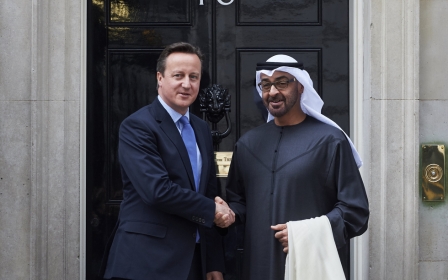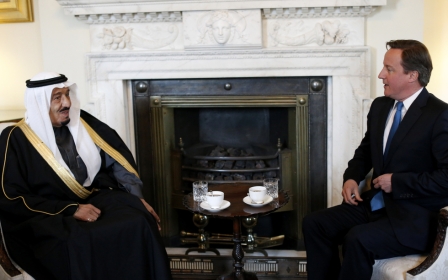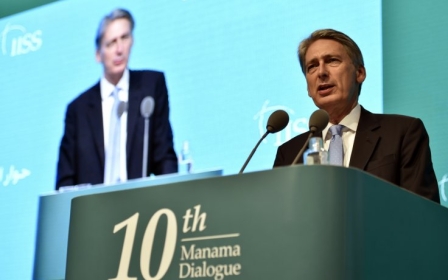UK says Muslim communities must ‘own’ problem of extremism

British Prime Minister David Cameron on Monday unveiled a new counter extremism strategy, which will aim to stop young Britons travelling to Syria. In it he called on Muslim communities to “own” the problem of "Islamist extremism", which he called "one of the struggles of our generation".
Key proposals in the plan include allowing parents to have passports removed from 16- and 17-year-olds, barring those with terrorism or extremist convictions from working with children and vulnerable people, and closing down mosques where extremism is deemed to be preached.
The new Counter-Extremism Strategy will also include a review of Britain's citizenship rules, making “good character” a key requirement in citizenship applications.
“Gaining British citizenship is a privilege and should signal a person’s commitment to becoming an active member of our society,” the strategy read.
“[We] will also consider who should be automatically entitled to citizenship and how we can more easily revoke citizenship from those who reject our values.”
A prominent commentator on Twitter who is an associate fellow at the Royal United Services Institute in London and an Arab affairs specialist at the Brookings Centre for Middle East Policy in Washington said new plans to remove citizenship were worrying.
Home Secretary Theresa May has also ordered a campaign to remove “entryists” from the public sector, pledging to weed out “extremists” from local authorities, charities and businesses.
Media regulator Ofcom will be empowered to take down radio and television outlets that are deemed to broadcast extremist material.
The 39-page government strategy mentions British values 54 times. On page nine British values are defined as: “[The] rule of law, democracy, individual liberty, and the mutual respect, tolerance and understanding of different faiths and beliefs.”
In the same section the government sets out its definition of extremism as “the vocal or active opposition to our fundamental values, including democracy, the rule of law, individual liberty and the mutual respect and tolerance of difference faiths and beliefs. We also regard calls for the death of members of our armed forces as extremist.”
Asim Qureshi, research director of CAGE, said the government failed to make clear which values they define as being British.
“There’s such a heavy emphasis in the report on British values but the terms are so vague you don’t actually know what they are talking about," he said.
CAGE works with victims of the global War on Terror and has come under fire for its criticism of the British security services, who they say have contributed to the radicalisation of British Islamic State group members. Cameron has accused the group of being extremist, an allegation CAGE has vehemently denied.
Qureshi said that the prime minister’s attempts to British values he says are under fire is “to set aside what most people would consider to be British values in order to deal with this supposed threat.”
“It’s part of a wider post-9/11 narrative that says anything becomes acceptable in the name of national security. There needs to be a less aggressive approach to the [Muslim] communities [the government] is trying to work with."
The government's counter-extremism strategy went further than discussing British Muslim communities, and included provisions to tackle far-right groups, but Qureshi said the plan still appears a narrow one.
“It’s disingenuous of the government to talk of a broad strategy to tackle all types of extremism when the vast majority of the report focuses solely on Muslims," he said.
Prime Minister Cameron made clear what he believes the biggest issues is to address, describing on Monday the battle against “Islamist extremism" as "one of the great struggles of our generation.”
"In responding to this poisonous ideology, we face a choice," Cameron said.
"Do we close our eyes, put our kid gloves on and just hope that our values will somehow endure in the end? Or do we get out there and make the case for those values, defend them with all that we've got and resolve to win the battle of ideas all over again?"
British police claim to have foiled numerous potential attacks in the UK, but have not released details of the plans for operational reasons. Hundreds of Britons are believed to have travelled to Syria and Iraq to join the Islamic State group and authorities have warned returning fighters pose a threat to UK security.
Last month it was revealed that for the first time the UK had targeted and killed two British members of IS in a drone strike on Syria.
A 15-year old boy, thought to be Britain's youngest person convicted of terrorism, was sentenced earlier this month to a minimum of five years in jail for plotting an IS-inspired "massacre" on an Anzac Day parade in Australia.
Citing police figures, Cameron's Downing Street office said there were 338 counter-terrorism related arrests in the past year, with 157 linked to Syria and 56 involving suspects under 20.
Cameron called on the Muslim community to do more to combat the threat.
"The extremist narrative needs to be fought every day at the kitchen table, on the university campus, online and on the airwaves," said the prime minister.
"As a government, I know we must own this problem. But our Muslim communities must own it too. We have all got a critical part to play, but I strongly feel the currently silent majority can make all the difference."
The Muslim Council of Britain (MCB) warned that Cameron's strategy risked isolating their communities.
"Whether it is in mosques, education or charities, the strategy will reinforce perceptions that all aspects of Muslim life must undergo a 'compliance' test to prove our loyalty to this country," said MCB general secretary Shuja Shafi.
Shafi added that he was concerned terrorism will be conflated “with subjective notions of extremism and Islamic practices”.
The MCB head called on the government to avoid past mistakes and stop funding to “organisations or individuals whose main or primary qualification is to serve as echo-chambers for what government wishes to hear.”
The comment was a barely veiled retort to the Quilliam Foundation, a self-styled counter extremism think tank headed by Maajid Nawaz.
Nawaz was jailed for five years in 2001 while studying in Egypt and was convicted of belonging to the banned Hizb ut-Tahrir group, which calls for the establishment of a global caliphate. After being released in 2006 Nawaz renounced his beliefs, established Quilliam, and has since embarked on a high-profile career in calling for reforms to Islam.
Quilliam, which says it has not received government funding since 2011, has been criticised in some quarters for adding to a perception of British Muslims as a suspect community.
Despite not receiving state funding the organisation has remained key to the government’s counter extremism approach and on Monday their research was included in a press release announcing the new strategy.
New MEE newsletter: Jerusalem Dispatch
Sign up to get the latest insights and analysis on Israel-Palestine, alongside Turkey Unpacked and other MEE newsletters
Middle East Eye delivers independent and unrivalled coverage and analysis of the Middle East, North Africa and beyond. To learn more about republishing this content and the associated fees, please fill out this form. More about MEE can be found here.




